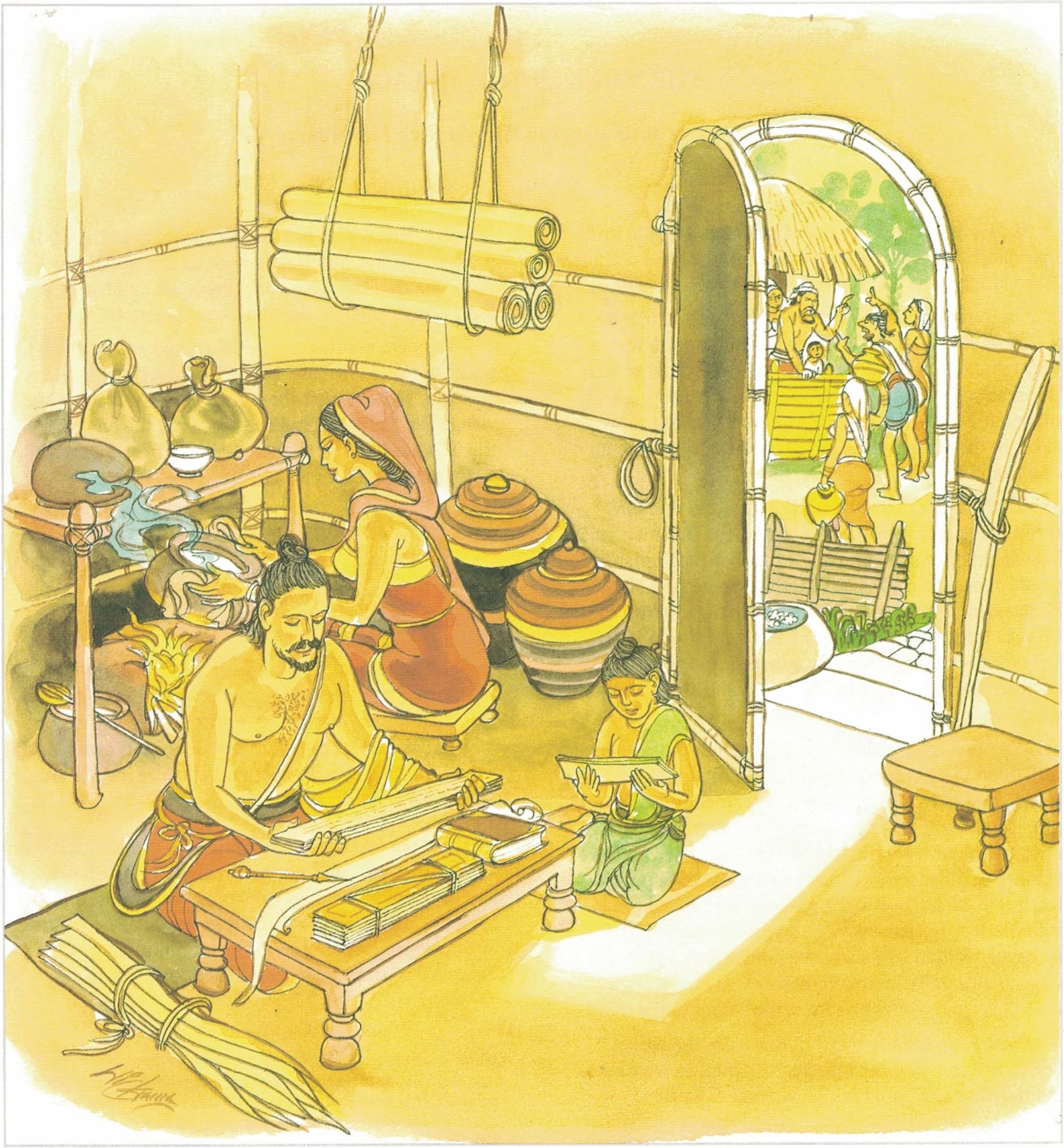Dhammapada (Illustrated)
by Ven. Weagoda Sarada Maha Thero | 1993 | 341,201 words | ISBN-10: 9810049382 | ISBN-13: 9789810049386
This page describes The Story of the Ascetic Paveyya which is verse 50 of the English translation of the Dhammapada which forms a part of the Sutta Pitaka of the Buddhist canon of literature. Presenting the fundamental basics of the Buddhist way of life, the Dhammapada is a collection of 423 stanzas. This verse 50 is part of the Puppha Vagga (Flowers) and the moral of the story is “Consider only your own commissions and omissions and not those of others”.
Verse 50 - The Story of the Ascetic Pāveyya
Pali text, illustration and English translation of Dhammapada verse 50:
na paresaṃ vilomāni na paresaṃ katākataṃ |
attano'va avekkheyya katāni akatāni ca || 50 ||
50. Not others’ opposition nor what they did or failed to do, but in oneself should be sought things done, things left undone.
 Consider only your own commissions and omissions and not those of others. |
The Story of the Ascetic Pāveyya
While residing at the Jetavana Monastery, the Buddha spoke this verse, with reference to the ascetic Pāveyya and a rich lady.
One of her nearest neighbours, who went to hear the Buddha preach the Dhamma returned praising the virtues of the Buddhas in manifold ways, saying, “Oh how wonderful is the preaching of Dhamma!” When the woman heard her neighbours thus praise the Buddha, she desired to go to the Monastery and hear the Dhamma. So she put the matter to the naked ascetic, saying, “Noble sir, I desire to go and hear the Buddha.” But as often as she made her request, the naked ascetic dissuaded her from going, saying, “Do not go.” The woman thought to herself, “Since this Naked Ascetic will not permit me to go to the monastery and hear the Dhamma, I will invite the Buddha to my own house and hear the discourse right here.”
Accordingly, when it was evening, she summoned her own son and sent him to the Buddha, saying to him, “Go, invite the Buddha to accept my hospitality for tomorrow.” The boy started out, but went first to the place of residence of the naked ascetic, greeted him, and sat down.
The boy listened to the instructions of the naked ascetic and then went to the Buddha and delivered the invitation. When he had done everything according to the instructions of the naked ascetic, he returned to the latter. The naked ascetic asked, ‘What did you do?” The boy replied, “Everything you told me to do, sir.” “You have done very well. Now we shall both of us eat the good things prepared for him.” On the following day, very early in the morning, the naked ascetic went to that house, taking the boy with him, and the two sat down together in the back room.
The neighbours smeared that house with cow-dung, decked it with the five kinds of flowers, including the Lājā flower, and prepared a seat of great price, that the Buddha might sit therein.
The Buddha, very early in the morning, took the bowl and robe and went straight to the house of the great female lay disciple. When the Buddha had finished his meal, the female lay disciple listened to the Dhamma and applauded the Buddha, saying, ‘Well said! Well said!”
The naked ascetic said to the lay disciple, “You are lost for applauding this man thus.” And he reviled both the female lay disciple and the Buddha in all manner of ways, and then ran off. The Buddha asked her, “Lay disciple, are you unable to fix your mind on my discourse?” “Good and Revered Sir,” she replied, “My mind is completely distraught by the insulting words of this naked ascetic.” Said the Buddha, “One should not consider the talk of such a heretic; one should regard only one’s own sins of commission and omission.”
Explanatory Translation (Verse 50)
paresaṃ vilomāni na, paresaṃ katākataṃ na,
attano eva katāni akatāni ca avekkheyya
paresaṃ [paresa]: of others; vilomāni: fault-findings; na: do not (regard); paresaṃ [paresa]: of others; katākataṃ [katākata]: things done and not done; na: do not regard; attano eva: only one’s own; katāni akatāni ca: omissions and commissions; avekkheyya: examine carefully (scrutinize)
Do not find fault with others. Do not worry about what others do or not do. Rather, look within yourself to find out what you yourself have done or left undone. Stop doing evil; do good.
Commentary and exegetical material (Verse 50)
paresaṃ katākataṃ: commissions and omissions of others. This Stanza examines a weakness of a majority of human beings. They keenly observe the faults of others, but not their own. This is not limited to laymen. Even monks practice this habit of observing the faults of others. This attitude of looking at others is a hindrance to spiritual development as it prevents introspection which is essential for one’s spiritual progress.
